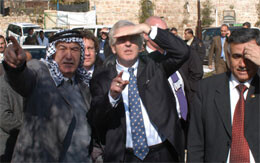The Electronic Intifada 20 February 2008

UN under-secretary-general for humanitarian affairs John Holmes on a tour of Hebron in the West Bank. (JC Tordai/OCHA)
Wrapping up a five-day trip on 18 February, he said he had come to visit Israel and the Occupied Palestinian Territory (OPT) to see the situation on the ground and do what he could to increase movement into and out of Gaza.
“The conditions in Gaza are grim and miserable and are not in accordance with the standards of human dignity,” Holmes told reporters in Jerusalem. He expressed concern about the quality of nutrition, especially amongst children, noting that 73 percent of the population received food aid, and levels of dependency were rising. Water quality and availability had declined, he said.
The restrictions on imports of raw materials and equipment had affected about US$230 million worth of humanitarian projects, included those of UN agencies, he said.
Israeli military officials told IRIN some cement had been allowed in on 18 February for a sewage project, but could not confirm whether future shipments would be made for UNRWA and other agencies, and why an item previously banned as it was considered a security threat was now allowed in.
Holmes said he did not agree with Israeli policy to cut back on power and fuel supplies to Gaza, and that he doubted it would stop rockets. He said Israel’s measures “collectively penalize an entire population,” noting that the medical sector is “teetering on the edge of viability.”
During the trip he met businessmen in the enclave and reached the conclusion that “private industry has more or less collapsed.”
Holmes also condemned the rocket attacks during a visit to Sderot. “These victims here are innocent civilians. There is no time to lose in putting an end to this vicious circle of violence,” he said.
According to the Israeli rights group B’Tselem, 79 Palestinians in Gaza, including 22 who did not take part in hostilities, were killed by the Israeli military in January this year.
However, Holmes’ remarks were criticized by the Israeli Ministry of Foreign Affairs: He created “an analogy between the terrorists and those who are defending themselves against terror,” the ministry’s director-general, Aaron Abramovich, said in a statement.
This item comes to you via IRIN, a UN humanitarian news and information service, but may not necessarily reflect the views of the United Nations or its agencies. All IRIN material may be reposted or reprinted free-of-charge; refer to the copyright page for conditions of use. IRIN is a project of the UN Office for the Coordination of Humanitarian Affairs.
Related Links
